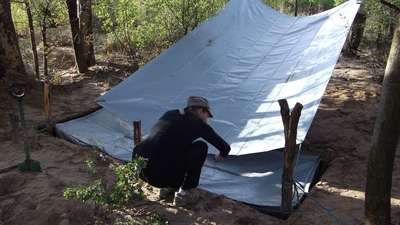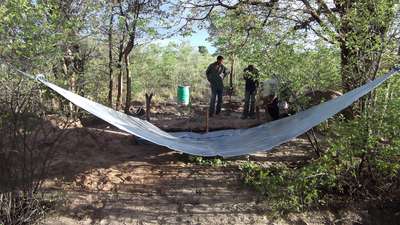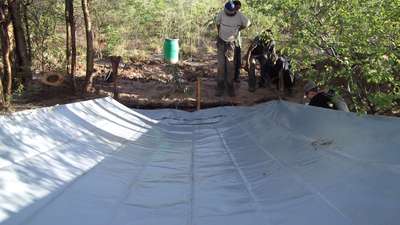|
Great news for remote Kalahari Communities deprived of easy access to clean drinking water! Thanks to the generous support of the COMANIS FOUNDATION, we have finally received our first sponsorship for the manufacturing and installation of 10 X 3000 litre-capacity portable rainwater harvester (a.k.a "PRH") units. Our own unique invention - the PRH safely and efficiently captures and stores any amount of natural rainfall, protecting it from evaporative loss. Fully portable and easily cleaned and maintained by the end user, we believe the PRH has the potential to revolutionaize drinking water security in rural areas: In semi-arid regions globally, surface and ground water may be severely lacking or extremely costly and problematic to extract, transport and safely use. In high rainfall regions, water supplies are frequently exposed to contaminants which can cause life threatening diseases. The PRH dramatically reduces these risks as well as the total costs and time associated with the provision of drinking water by:
1. Enabling extremely cost-effective transportation and installation, on account of it being able to be folded up into a carry bag, allowing for low-cost mass transportation. Installation can be done by the end-user after basic training, without the need for any skilled labour or special tools. 2. Being easy to operate, clean and maintain - and at zero cost - thus cutting out the need for end-user dependency on the regular importation of costly, skilled maintenance crews. 3. Empowering communities to locate water supplies at or close to where they actually live, thus enabling full end-user quality control and dramtically reducing the time and energy expenditure involved in obtaining drinking water. The competition, stress and health risks associated with increasingly unreliable and overused centralised water supplies - all of which are being exacerbated by climate change - can be largely avoided in this way. The prototype units will be installed in a number of identified Kalahari community areas around Botswana where their operation will be monitored as part of our ongoing research and development program in partnership with the University of Connecticut Engineering Department. At only 400mm of rain per year, these units will generate enough clean drinking water for up to 130 people per year, on an ongoing basis.
0 Comments
Leave a Reply. |


